The new kings of the sea
On 9th October 2012, Prince Roy of Sealand, the man who set up his own country off the coast of Essex, died aged 91. In issue #9 of Delayed Gratification, we asked who would fill the void and discovered the 'seasteaders' who want to launch "a thousand floating Hong Kongs" in international waters and change government and society forever
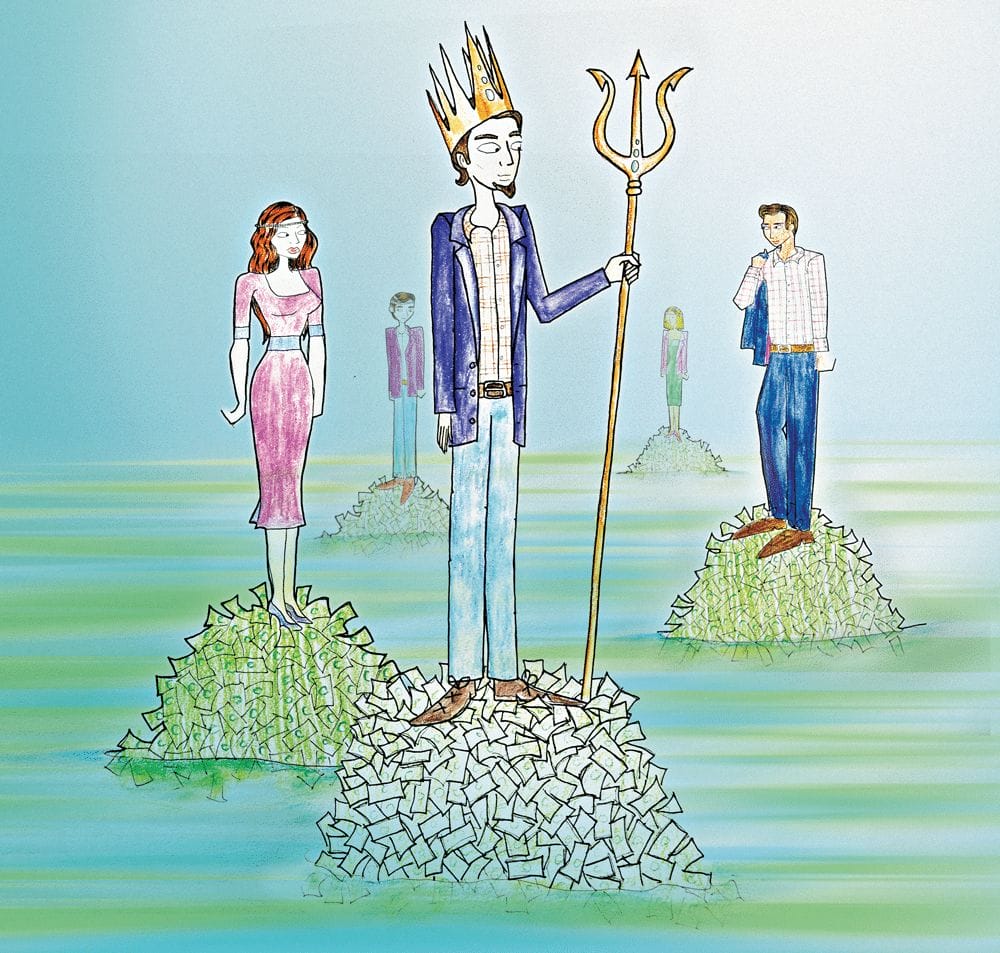
Illustration: Anne Gerrish
9th October 2012 (Taken from: #9)
‘E mare libertas’
(From the sea, freedom)
Motto of Sealand
“The ocean will be the start-up sector, the place where the newest, most cutting-edge governments get created,” says Patri Friedman. “Our current options for government don’t seem very good. And because nobody’s getting to try new ones, I expect that we can do better.”
Friedman, a former Google software engineer and grandson of Nobel laureate economist Milton Friedman, is the founder of the Seasteading Institute. He wants to encourage the formation of floating cities in international waters where, released from the laws and systems of the land, people can experiment with new forms of government.
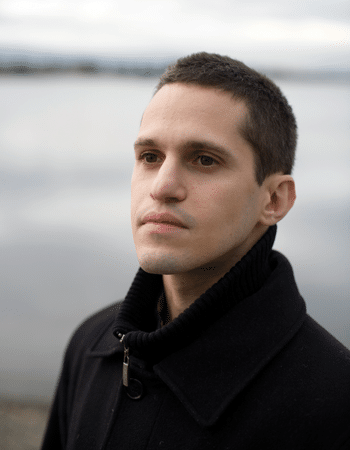
Patri Friedman. Photo: The Seasteading Institute
“I’m a customer,” he tells me. “And what seasteading offers me, and what I think I really want now is just more options and more innovation. You know, a market for government. And maybe the place that I’d like to live turns out to be a place where you aren’t allowed to criticise the ruler, for example. But it’s like – you couldn’t have worked at Apple and criticised Steve Jobs. They’d have fired you! But they make great products.”
Such innovation was possible when America still had a frontier and when the world still had unclaimed territories. But now, with every inch of earth claimed by some jurisdiction or other, it’s impossible to experiment on dry land. “Trying to change things in place is kinda like trying to engineer a better engine on a car that never stops driving,” says Friedman. “It’s really hard to change a system which is in place and functioning and people are used to it. There’s something incredibly powerful about making something new and then slowly adding users to it over time.”
“You don’t release a new piece of software to everyone right away. You patch it, you roll it out for a few people, and then more and more. And that’s how you’re able to make quantum leaps in technology. Any time you do that, any time you totally change how things work, there are going to be bugs. I wouldn’t want the US to suddenly try a brand-new political system for 300 million people. It wouldn’t be a good idea.”
Friedman is not alone in his marine utopianism. The seasteading movement has been backed by credible Silicon Valley businesspeople and has received substantial funding from PayPal founder Peter Thiel. Seasteading is a broad church: it attracts Ron Paul libertarians; Ayn Rand groupies; engineers excited about the possibilities of building offshore cities; biologists keen to work on new energy sources (“We don’t need fossil fuels. We’ll have kelp!”); entrepreneurs scenting the financial possibilities of opening up deregulated new frontiers; hedonists keen to escape mainland legal systems with their awkward views on high grade narcotics and – as with any fringe movement – its fair share of outright nutters.
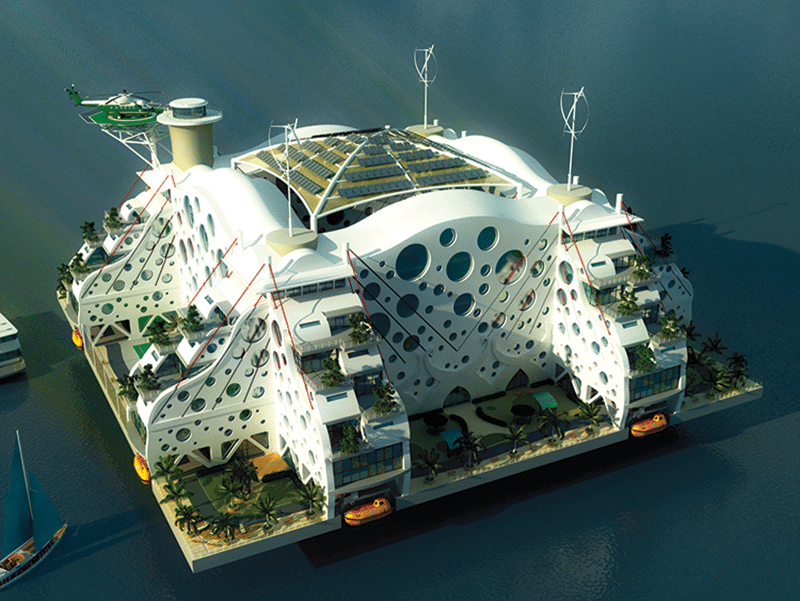
‘Oasis of the Sea’, a design submitted for the Seasteading Institute’s design contest. Photo: The Seasteading Institute
But seasteading is not a new idea. Back in 1895, Jules Verne wrote L’Île à hélice (Propeller Island), subtitled ‘The Ridiculous Billionaires’, about a group of wealthy, disaffected Americans who decided that they were sick of the States, and clubbed together to build a floating country which toured the oceans of the world, ensuring a permanent summertime for the wealthy residents. The dream fizzled out before long, as the island split into two bitterly opposed factions, the “Larboardites” and the “Starboardites”.
Undeterred by Verne’s warning, scores of swashbuckling, sometimes delusional real-world adventurers have attempted to put the seasteading dream into reality and create a new nation for themselves in the freedom of international waters.
“Every free human being dreams of founding an independent state”
In 1964, Leicester Hemingway, younger brother of Ernest, declared the creation of the Republic of New Atlantis, a bamboo raft tethered to the seabed 13 kilometres southwest of the Jamaican coast. Despite the new nation being only 18 square metres in size, Hemingway created a constitution for it, which called for the creation of “a Congress of New Atlantis” elected by direct vote every second year, and provided grounds for impeachment of the senate president.
Hemingway told the New York Times that he and his seven fellow New Atlantians “can stand on the platform, walk around on it and salute the flag, which we do periodically”. New Atlantis stamps were issued, and there were plans afoot to increase the territory of the republic by extending the raft. Sadly, before they could be realised the nation was washed away by a tropical storm in 1964. Luckily, it was unoccupied at the time.
In 1967, Giorgio Rosa had a 400-square-metre platform built in the Adriatic, off the coast of Italy. He declared independence a year later, under the Esperanto name ‘Respubliko de la Insulo de la Rozoj’ (Republic of Rose Island).
It was the most advanced new country to date, with its own post office, club and restaurant. Asked about his motivations in a recent interview with Corriere della sera, Rosa said he had wanted to “build something that was free from traps and snares and did not cost a lot. On the mainland the bureaucracy was stifling… Let’s face it, every free human being dreams of founding an independent state.”
The Italian authorities did not share his enthusiasm. They variously denounced Rose Island as a tax dodge and a disguised Soviet submarine base, and despatched the carabinieri to clear the island. The navy then strapped 1,000 pounds of dynamite to the pylons holding the structure up, and blew it to smithereens. “I understood then that in Italy it is impossible to be free, to do things alone,” said Rosa.
Another attempt at aquatic autonomy was made in 1973, when the Republic of Minerva was proclaimed by a group of American businessmen led by libertarian real estate developer Michael Oliver and engineer Morris C “Bud” Davis. Minerva, which comprised a platform built on dredged sand piled on to a small reef in the South Pacific, was to be a country free of state interference, with no tax or welfare system.
The project did not last long. After raising their jaunty flag (a torch on a blue background) and building a small tower, the Minervans foolishly sought recognition from King Taufa’ahau Tupou IV of Tonga, who responded by sending a boatload of convicts and a four-piece brass band to destroy the flag, play the Tongan national anthem and read out a proclamation of sovereignty. The invasion was passing off peacefully until a scuffle broke out between two convicts, one of whom killed the other.
Dozens of other attempts have been made – including the Kingdom of Humanity (declared on Meads Island in the South China Sea in 1914 and whose national anthem was Beethoven’s Fifth Symphony); Oceania, a billion-dollar project to build floating islands in the Caribbean and offer a “capitalist paradise” (it ran out of money before construction began); and the Gay and Lesbian Kingdom of the Coral Sea Islands, set up by Emperor Dale Anderson I, whose first act was to declare war against Australia as a protest against the country’s failure to legalise gay marriage.
But the only real success story to date is Roy Bates’s Principality of Sealand.
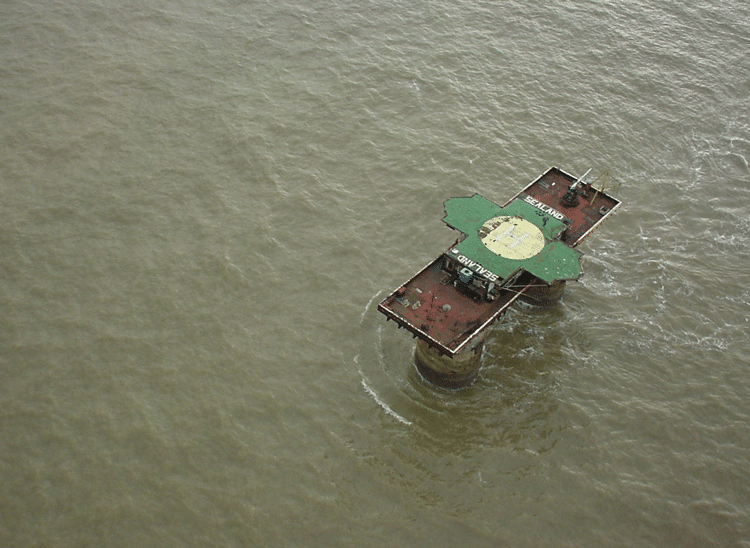
Sealand
Cuba off the east coast of England
“My father was always a very free spirit,” says Prince Michael of Sealand, son of Prince Roy. “After the war he got involved in fishing boats. A lot of commercial fishermen used to slate yachts, and my father said, ‘Well actually it’s quite nice. It’s one of the last freedoms left – that anyone can get a yacht and sail the world, and hardly be answerable to anybody.’ And of course then he got involved with pirate radio which was about freedom from regulations.”
Roughs Tower was a WWII anti-aircraft radar platform lying seven nautical miles off the coast of Essex. In 1966 Roy Bates, indignant at the government’s attempts to close down his pirate radio station, Radio Essex, occupied the fort. In 1967 he declared it to be the independent principality of Sealand, and made his wife Joan the princess of the new nation. As with the republics of Rose Island and Minerva, the authorities were not impressed.
“Harold Wilson was in power when Sealand declared independence,” says Prince Michael, “and it was suggested to him that we could be the Cuba off the east coast of England.”
Plans were made to retake the platform by force, but were dismissed by Wilson as potential PR disasters. When Roy and Michael appeared in court for firearms offences after taking a potshot at a boat which came too close, the judge ruled that they could not be tried as their platform lay outside UK jurisdiction, which at the time stretched only three nautical miles from the coast. The Bates family took this as de facto recognition of Sealand’s sovereignty.

Roy Bates, his wife Joan, daughter Pennie and the staff of Radio Essex, 1966 Photo: PA Archive/Press Association Images
In 1978 the world’s smallest ever coup d’état took place when Alexander Achenbach, a German businessman who had been issued a Sealand passport, took advantage of Prince Roy’s brief absence from the country to storm it with a handful of mercenaries. Prince Roy, a former army major, was not the sort of man to be turfed out of his home. He returned with Prince Michael in a dawn raid, rappelled down from a helicopter, retook the nation and held one of the invaders captive, accusing him of treason against Sealand and demanding a ransom of 75,000 deutschmarks. In the absence of action from the British, the German government sent diplomats to negotiate the release of their citizen.
If at least part of your life isn’t doing something new that no one has ever done, you’re not really living. You’re just reading from a script”
So what was it like living on this windblown scrap of decommissioned naval hardware? “It was very tough,” says Prince Michael. “When we first got there we only had candles and then we got hurricane lamps and Tilley lamps and eventually we got generators running. In winter you would go out with a hammer and chisel to get water as the tanks were all frozen solid.”
In 2000, the Bates family struck a deal with American businessmen Ryan Lackey and Sean Hastings to set up a data-hosting company at Sealand, called HavenCo. The venture was dogged from the beginning by poor satellite signals and the fallout from the dotcom crash. Like Prince Michael, HavenCo’s executives found conditions in Sealand austere at best.
“If you were wandering around at night looking for the bathroom you could plummet seven storeys to your doom,” said Hastings at a presentation at a seasteading conference. “It was not a safe place… A lot of times I was out there I was wondering, what the hell am I doing living on a sea platform?” It was not just the human inhabitants who suffered. “We had a dog on Sealand. I would suggest that any potential seasteaders be cat people. He didn’t get a lot of exercise, he got very fat.”
When not working, Hastings introduced his fellow residents to the joys of kendo, which he made Sealand’s national sport: wonderful footage remains of HavenCo security officials, half-crazed with cabin fever, knocking seven bells out of one another with bamboo swords. But for all the privations, and despite the failure of his business, Hastings doesn’t regret his residency at Sealand. “You were lord of all you surveyed,” he said. “At least on a cloudy day when you couldn’t see the coast of England… If at least part of your life isn’t doing something new that no one has ever done, you’re not really living. You’re just reading from a script.”
After HavenCo failed, the Bates family moved back to Sealand. “It goes on to the next generation,” says Prince Michael. “My boys are all involved now. James is 26, Liam’s 24. And my daughter, she’s 21.” A movie about Sealand is in the pipeline, and Prince Michael tells me about a project to raise some land over the sea to increase the size of his principality.
So what – apart from the threats of fat dogs, German mercenaries and Tongan convicts – is holding other seasteaders from following in the footsteps of the Bates family and launching the new wave of Sealands? The biggest stumbling block, according to Patri Friedman, is money. “If we had the budget of the oil industry, the ocean would be full of floating cities,” he says. The challenge now is to launch a first seastead which makes money, proving that this is not just a libertarian fantasy but can be financially viable.
This is where Blueseed comes in.
Silicon Valley on sea
“The main worry people have is pirates,” says Dan Dascalescu, co-founder and Chief Technical Officer of Blueseed. “It’s a completely ridiculous issue. Blueseed will be off the coast of California. Any pirates are halfway across the globe. It’s just not going to happen.”
Blueseed is the great white hope of seasteading. Set to launch in 2014, it will be a rented cruise ship moored in international waters where foreign businesspeople unable to afford the $1 million of investment needed to get a US entrepreneur’s visa will be able to rent rooms and office space for $1,600 a month (plus a 6.5 percent cut of their business) and commute to Silicon Valley by ferry on tourist visas. The ship will fly the flag of the Bahamas, and operate under Bahamian law. Despite fears about pirate attacks, entrepreneurs from across the world have been keen to secure a berth.
By putting together all these very smart people on the ship, we hope to achieve an effect similar to the Manhattan Project – but for a good purpose”
Although Dascalescu believes in the seasteading goals of governmental experimentation, his motives in setting up Blueseed are to show that seasteading can make money. “We don’t care about a new political system right now. We just want to put our foot in the water,” he says. “The proposition is purely commercial at this point.”
While there won’t be any chipping ice out of frozen water tanks in winter, accommodation won’t be palatial. “Entrepreneurs are supremely resilient,” says Dascalescu. “Most of them are young and adaptable, in their mid-twenties, so they won’t need much luxury.” An analysis of existing applicants shows that 80 percent are men: Blueseed is aiming to even this out by employing a lot of women in the crew, and by targeting “women in fashion-tech start-ups, or in meditech.”
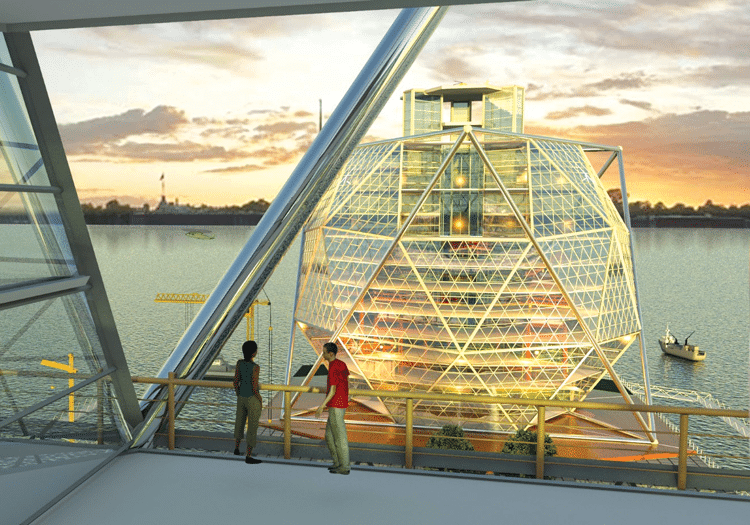
Blueseed
Blueseed won’t tolerate the hedonistic free-for-all anticipated by some seasteaders. “We’re going to have very strict drug control – zero tolerance,” Dascalescu confirms. “Because even if we allowed soft drugs, the US Coast Guard could find a problem with that and they could pursue us. We’re also not going to allow any financial operations which could be even the tiniest bit shady. Nothing to do with ‘adult’ businesses. The point is not to be some sort of free rogue nation, it’s to allow this group of entrepreneurs to come together and help each other succeed.”
Dascalescu feels that even if the US’s visa laws change and entrepreneurs don’t need to locate themselves on a cruise ship, they’ll still want to stay on Blueseed. “The number one reason entrepreneurs want to be on board is the fantastic environment that they can find and create there, and living in an awesome start-up, technology-oriented place,” he says. “By putting together all these very smart people on the ship, we hope to achieve an effect similar to the Manhattan Project – but for a good purpose.”
The future of seasteading
“I started out thinking the Seasteaders were loony-bin libertarians, not to be taken seriously,” says Jason Sussberg. “I now think that they will absolutely do something and that it will have an impact on the American government.”
Sussberg is a documentary filmmaker who spent a year and a half following Patri Friedman’s seasteading movement, turning his experiences into a short film, ‘The Sea is a Harsh Mistress’. He watched Friedman and his followers debating the minutiae of life on floating cities, taking part in roleplay games involving putative asteroid strikes on hypothetical seasteads and congregating for ‘Ephermerisle’, an annual event at which seasteaders construct and live in a temporary ‘floating city’ on the Sacramento River Delta in California.
“Ephemerisle was a blast,” says Sussberg. “They basically created Burning Man on the water.” Sussberg’s footage shows a series of lashed-together boats and platforms, one flying a skull and crossbones flag, on which seasteaders in novelty hats dance, shout at each other for docking inelegantly and launch themselves into the water inside zorb balls.
By their own admission, things can get out of hand. On the Ephemerisle site’s “What worked and what didn’t in 2012” section, shortly before a plea for a “pre-event knot-tying event” in 2013, an administrator called Matt has vented his frustration. “I saw a hell of a lot more irresponsible drug use this year,” he says. “I have nothing against responsible drug use, but if I have to attend to your stupidity because you thought a floating city in the middle of a windstorm is a great place to take too much LSD, I’m not going to be happy.”
When seasteading consisted of little more than earnest conferences and hedonistic weekends on the Sacramento River, it could be hard to take seriously. But if Blueseed succeeds, giving the world a model of a functioning, profitable seastead, this whole movement could really take off. Though Friedman has stepped back from full-time leadership of the movement, he remains a persuasive advocate for seasteading, and speaking to him you get a real sense of possibility, of an idea that just needs a shift in perspective in order to blossom.
“The seasteaders and other futurist libertarians in Silicon Valley look kooky and absurd in the present” says Sussberg, “just as most pioneering ideas did in the past: the world being round, pocket computers, manned flight, vaccinations, going to the moon. But their ideas will have a net benefit on society that will seem quotidian in the future. They are big thinkers who likely won’t end up achieving their utopian ideals in totality, but they’ll likely improve policies in a more minor fashion en route to their grandiose goal. They’ll likely never achieve 1,000 different floating governments competing for utopia, but they may provide an excellent immigration startup (in BlueSeed) that could impact policies in the US.” Seasteading could be The Lord of the Flies on the high seas, or it really could be carving out new forms of government that we’re all going to be participating in 300 years from now. Maybe we’re all going to look back and think how much we regret not starting our own new countries on the ocean wave.
Slow Journalism in your inbox, plus infographics, offers and more: sign up for the free DG newsletter. Sign me up
Thanks for signing up.








